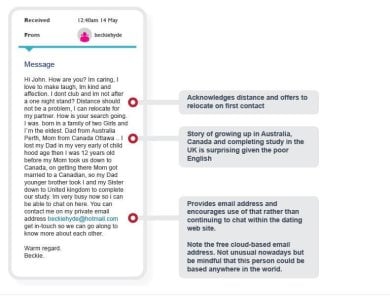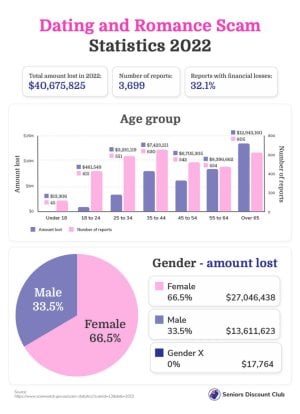Protect your heart (and bank account) this Valentine's Day from surging 'romance scams'
- Replies 6
Yes, love really does make us do crazy things.
But that shouldn’t include giving away your life savings to a stranger you met on the internet.
Just as we previously warned you of the dangers of identity theft, recruitment scams, and other nefarious activities that are done online, we must also now turn our attention to the rising number of 'romance scams’, especially now that Valentine's Day is just days away.
Don’t let your guard down – this piece of advice applies to both romance and the internet, as Aussies have been warned to stay vigilant against cybercriminals looking to capitalise on emotions this coming Valentine’s Day.
Last year, more than $40 million was lost in dating and romance scams across the country, according to Scamwatch.
The number of scams reported last year was in the thousands – although experts at Scamwatch believe that the real estimate is far higher.
According to the consumer watchdog, dating and romance scams often take place through online dating websites. However, scammers also use social media and emails to contact their victims.
Some also phone their victims as a first introduction or create a fake online profile designed to lure you in. They may take on the identities of real people but use fake names so as not to get caught.
They might mention that they’re from Australia but have moved overseas for work. This is a type of scam that’s also known as ‘catfishing’. A good example of a message you might receive from a scammer is this:
Be wary of people expressing strong emotions for you within a short time frame of meeting them, as dating and romance scammers will use your vulnerability to their advantage. They may suggest that you move communication to a more private channel, such as via phone, email, or online messaging apps.
Once you’re caught in their web, scammers will then go to great lengths to gain your interest, such as showering you with loving words, sharing ‘personal stories’ to make you relate to them more, and may even send you gifts to earn your trust.
An 80-year-old man from Queensland recently told his story of being in a ‘long-distance relationship’ with a woman named Freda to reporters, as an example of how dangerous romance scams can be. Things were going well between the ‘couple’. Freda even mentioned that she wanted to travel to Australia to get married.
However, the situation took a dark turn when Freda was suddenly involved in a ‘car accident’ and ‘urgently needed $20,000’ to pay her medical bills. You can read what happened next in this article.
In another instance, a woman named Cheryl almost fell victim to a romance scam after she just got out of an emotionally abusive relationship. While looking for ‘the one’ on dating apps, she matched with a man named Jackson who claimed to be a ‘gentleman’.
Cheryl told reporters that whenever she would ask Jackson for photos of his face, he would always give an excuse why he couldn’t send them.
He did, however, share ‘intimate’ photos with her and asked Cheryl to do the same.
After weeks of their whirlwind online romance, Jackson urged Cheryl to invest in a cryptocurrency share platform – one that turned out to be a scam. More details about this story can be read here.
A former romance scammer from Nigeria, who has seen the error of his ways, revealed to reporters the secrets that these cybercriminals use to make their victims fall in love. According to 23-year-old Adekunle Adedeji, who goes by ‘Chris’ as well, one of the main demographic scammer’s target single women aged over 40.
‘They are more vulnerable. A lot of them are divorced. They live alone, their kids are grown up so they are lonely and need someone to talk to them,’ he said.
He also shared that scammers would mine a potential victim’s social media pages for clues about their hobbies and then use the information to approach their victims. More details about his ‘catfish bible’ can be read here.
Natasha Mann, NSW Fair Trading Commissioner, said that although older adults are commonly the target of scams, it’s still important to remember that anyone could become a victim.
‘People may be becoming more scam savvy but if you let your guard down you might end up with more than a broken heart,’ she said.
Ms Mann added that con artists are also becoming more cunning, most of them use online games and websites to contact victims and build an emotional connection. And once these Casanovas have won their victims’ hearts, they will immediately come up with an elaborate story about why they need financial help.
If you’re contacted by someone and you’re unsure if the conversation is legitimate, ask someone you trust for their opinion.
Also, never send money to anyone you haven’t met in real life. Be cautious when sharing personal photos or videos as well, especially if you’ve never met them before. These compromising materials can be used as blackmail.
Lastly, if you think you’ve been scammed, report your experience to the dating website or social media site where the scammer first approached you. You can also report scams to the ACCC here.

Stay safe this Valentine’s Day, members! Do you have any tips for staying safe online? Share your experiences and tips in the comments below!
But that shouldn’t include giving away your life savings to a stranger you met on the internet.
Just as we previously warned you of the dangers of identity theft, recruitment scams, and other nefarious activities that are done online, we must also now turn our attention to the rising number of 'romance scams’, especially now that Valentine's Day is just days away.
Don’t let your guard down – this piece of advice applies to both romance and the internet, as Aussies have been warned to stay vigilant against cybercriminals looking to capitalise on emotions this coming Valentine’s Day.
Last year, more than $40 million was lost in dating and romance scams across the country, according to Scamwatch.
The number of scams reported last year was in the thousands – although experts at Scamwatch believe that the real estimate is far higher.
According to the consumer watchdog, dating and romance scams often take place through online dating websites. However, scammers also use social media and emails to contact their victims.
Some also phone their victims as a first introduction or create a fake online profile designed to lure you in. They may take on the identities of real people but use fake names so as not to get caught.
They might mention that they’re from Australia but have moved overseas for work. This is a type of scam that’s also known as ‘catfishing’. A good example of a message you might receive from a scammer is this:
Be wary of people expressing strong emotions for you within a short time frame of meeting them, as dating and romance scammers will use your vulnerability to their advantage. They may suggest that you move communication to a more private channel, such as via phone, email, or online messaging apps.
Once you’re caught in their web, scammers will then go to great lengths to gain your interest, such as showering you with loving words, sharing ‘personal stories’ to make you relate to them more, and may even send you gifts to earn your trust.
An 80-year-old man from Queensland recently told his story of being in a ‘long-distance relationship’ with a woman named Freda to reporters, as an example of how dangerous romance scams can be. Things were going well between the ‘couple’. Freda even mentioned that she wanted to travel to Australia to get married.
However, the situation took a dark turn when Freda was suddenly involved in a ‘car accident’ and ‘urgently needed $20,000’ to pay her medical bills. You can read what happened next in this article.
In another instance, a woman named Cheryl almost fell victim to a romance scam after she just got out of an emotionally abusive relationship. While looking for ‘the one’ on dating apps, she matched with a man named Jackson who claimed to be a ‘gentleman’.
Cheryl told reporters that whenever she would ask Jackson for photos of his face, he would always give an excuse why he couldn’t send them.
He did, however, share ‘intimate’ photos with her and asked Cheryl to do the same.
After weeks of their whirlwind online romance, Jackson urged Cheryl to invest in a cryptocurrency share platform – one that turned out to be a scam. More details about this story can be read here.
A former romance scammer from Nigeria, who has seen the error of his ways, revealed to reporters the secrets that these cybercriminals use to make their victims fall in love. According to 23-year-old Adekunle Adedeji, who goes by ‘Chris’ as well, one of the main demographic scammer’s target single women aged over 40.
‘They are more vulnerable. A lot of them are divorced. They live alone, their kids are grown up so they are lonely and need someone to talk to them,’ he said.
He also shared that scammers would mine a potential victim’s social media pages for clues about their hobbies and then use the information to approach their victims. More details about his ‘catfish bible’ can be read here.
Natasha Mann, NSW Fair Trading Commissioner, said that although older adults are commonly the target of scams, it’s still important to remember that anyone could become a victim.
‘People may be becoming more scam savvy but if you let your guard down you might end up with more than a broken heart,’ she said.
Ms Mann added that con artists are also becoming more cunning, most of them use online games and websites to contact victims and build an emotional connection. And once these Casanovas have won their victims’ hearts, they will immediately come up with an elaborate story about why they need financial help.
If you’re contacted by someone and you’re unsure if the conversation is legitimate, ask someone you trust for their opinion.
Also, never send money to anyone you haven’t met in real life. Be cautious when sharing personal photos or videos as well, especially if you’ve never met them before. These compromising materials can be used as blackmail.
Lastly, if you think you’ve been scammed, report your experience to the dating website or social media site where the scammer first approached you. You can also report scams to the ACCC here.
Key Takeaways
- Aussies have been warned to be vigilant of potential romance scams this Valentine’s Day.
- Last year, more than $40 million was lost to dating and romance scams across the country.
- Con artists are becoming more cunning and evolving using online games and websites to contact victims and build an emotional connection.













